|
|
|
Sort Order |
|
|
|
Items / Page
|
|
|
|
|
|
|
| Srl | Item |
| 1 |
ID:
090695
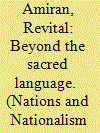

|
|
|
|
|
| Publication |
2009.
|
| Summary/Abstract |
This paper aims to shed light on the evolution of the Jewish national language and to discuss the ways in which the cultural trends in Zionism constantly left room for the creative imagination of its adherents, and functioned in such a way as to erode its sacred dimension, thereby promoting a discourse focusing on the individual. My claim is that the Hebrew language case study may reflect the importance not only of national revisionist accounts for our understanding of the Zionist movement, but also the need for an approach that saves a place for truly creative aspects of civic engagement, and recognises the Israeli nation as one asserting, besides its ethnic ties also patriotic nexuses. Special attention will be given to the phenomenon of Hebrew poetry written by women in the 1920s as a platform from which to examine the unique meaning and evolution of language within the Jewish national movement.
|
|
|
|
|
|
|
|
|
|
|
|
|
|
|
|
| 2 |
ID:
189029
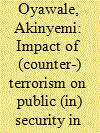

|
|
|
|
|
| Summary/Abstract |
This article examines the impact of (counter-)terrorism on public (in)security in Nigeria through engaging with non-elite understandings of ongoing conflicts in the northeast. Through 41 in-depth interviews carried out during a four-month fieldwork exercise with internally displaced persons in Nigeria, the article contributes to current (counter-)terrorism research on Nigeria and Africa by examining the lived experiences of non-traditional security ‘practitioners’, thus enriching current debates about ‘deepening’ and ‘broadening’ the security concept within critical security studies. The images of security that emerge show that the public in Nigeria adopt two main discursive devices, that is, a story and an interpretative repertoire, to discursively position themselves in relation to Boko Haram, the state and societal discourses and practices. Two discourses are prominent, namely a ‘(counter-)terrorist people’ discourse and a ‘kafir’ or ‘infidel’ discourse, which are constructed around ‘ethnic’ and ‘religious’ identities. This vernacular study of public understandings of (counter-)terrorism in Nigeria achieves three primary objectives: (i) it serves to invigorate debates around the meaning and practice of (in)security in Nigeria, (ii) it expands public (in)security debates on Africa, and (iii) it enriches vernacular research debate through foregrounding the experiences of groups and individuals who experience insecurity in their everyday lives.
|
|
|
|
|
|
|
|
|
|
|
|
|
|
|
|
| 3 |
ID:
175483
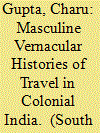

|
|
|
|
|
| Summary/Abstract |
This article focuses on vernacular travel writings on America and Europe by Swami Satyadev ‘Parivrajak’ (1879–1961), one of the first persons to systematically write travelogues in Hindi. I argue that Parivrajak’s travel literature was part of a colonised nation’s attempt to reclaim a space of freedom, forged through the carving of ‘perfect masculine bodies’, which embodied his ideals of beauty and pleasure. It was a performative, political act that inscribed gendered landscapes with a dialogue between East and West, slavery and freedom. The Hindu male’s subaltern masculinity had to be overcome through diverse means, all of which metaphorically interacted to shape Parivrajak’s writings.
|
|
|
|
|
|
|
|
|
|
|
|
|
|
|
|
| 4 |
ID:
175490
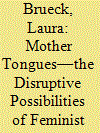

|
|
|
|
|
| Summary/Abstract |
This essay considers the methodological intervention of understanding a ‘mother tongue’ (matribhasha) as a gendered vernacular. It seeks to illustrate the subversive potential of the vernacular as a gendered lens though which we can understand the Dalit feminist critiques of caste hierarchies and Dalit and non-Dalit patriarchies, and the places they intersect. The essay considers the works of Anita Bharti and Meena Kandasamy, contemporary Dalit women authors who write in Hindi and English, respectively. Thus, this paper extends the definition of the vernacular beyond the confines of linguistic and regional specificity, allowing for a feminist reclamation of the term.
|
|
|
|
|
|
|
|
|
|
|
|
|
|
|
|
| 5 |
ID:
190732
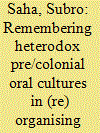

|
|
|
|
|
| Summary/Abstract |
The paper explores what a (re)organisation of the existing histories of Bangla literature from Dalit literary perspectives can offer. Towards this end, it examines some of the early questions on the formation of literary standards and how that remained directly connected with caste hierarchies. It turns briefly towards late eighteenth and early nineteenth century Calcutta as a discursive-material site to explore symptomatically how such organising of dominant literary standards works its way through various forms of exclusion. When seen from the perspective of these exclusions, what does the question of Dalit literature offer in transforming the very idea of ‘literariness’? Also, what can the vernacular literatures offer in the reception of Dalit literatures in their multiplicity while resisting the tendencies of homogenising their volatility? Addressing such concerns, the paper turns towards a conceptualisation of Bangla Dalit literature as offering a poetics for multiple forms of dwelling.
|
|
|
|
|
|
|
|
|
|
|
|
|
|
|
|
| 6 |
ID:
103874
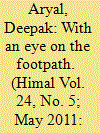

|
|
|
| 7 |
ID:
093092
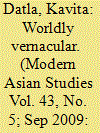

|
|
|
|
|
| Publication |
2009.
|
| Summary/Abstract |
Twinned as Urdu has become with the fate of India's largest religious minority, Muslims, and with the emergence of the independent state of Pakistan, for which Urdu is the official national language, the story of Urdu holds a peculiar place and a special significance in histories of the subcontinent. Stories of the Urdu language are dramatic, bound up as they are in questions of politics, the fate of Hindus and Muslims and the vicissitudes of both the Urdu and the Hindi languages. Though Hindi-Urdu language politics are an important part of these languages' colonial history, this article emphasizes another story. For, like the other vernaculars of south Asia, Urdu had to contend as much with English as with Hindi, and it is that story that is emphasized here. This article details how early-twentieth-century Hyderabad's Urdu educators engaged with questions of native education, language, and Western science. It highlights the discussions and disagreements that accompanied this educational project as Urdu advocates re-evaluated their language and its sources of authority, attempting to make the Urdu language a worldly vernacular, useful for more than the subcontinent's Muslim population.
|
|
|
|
|
|
|
|
|
|
|
|
|
|
|
|
|
|
|
|
|